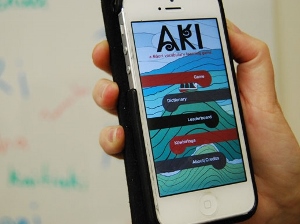

<p><img class=" alignright size-full wp-image-1172" src="http://schoolnewsnz.fastrackdev.com/wp-content/uploads/2014/11/SND09-wk3-Maori_Language_App_300x224.jpg" alt="SND09-wk3-Maori Language App 300x224" style="margin: 5px; float: right;" width="300" height="224" />A University of Otago research project to find out how Dunedin families pass on Māori to their children has led to the development of an innovative new Māori Language App, called Aki.</p>
<p> <!--more--> </p>
<p>Aki is a free Māori language vocabulary and phrase-learning app for i-Phones and i-Pads that involves participants in an interactive game. Its aim is to develop Māori language skills, particularly in young people, with fewer in this age group speaking te reo, according to the most recent Census figures.</p>
<p>One of the developers, Otago&#8217;s Dr Katharina Ruckstuhl, says the project is the culmination of research started in 2010 involving herself, and fellow academics the late Dr Tamar Murachver of the Psychology Department and Associate Professor Poia Rewi at Te Tumu, the School of Māori and Indigenous Studies at Otago</p>
<p>&#8220;We were looking at how families in Dunedin passed on Māori language to their children.</p>
<p>&#8220;One of the things that we noticed was that, when we gave them visual vocabulary learning posters, they used them enthusiastically for a while and then they stopped &#8216;seeing&#8217; them. They became too familiar and merged into the background.</p>
<p>&#8220;We thought that we would use a different medium – an app – as many of the families said that their children enjoyed using games.&#8221;</p>
<p>With the technical help of Grant Baxter, an iOS App developer from AppLab Ltd and Professional Practice Fellow with the University&#8217;s Department of Applied Science, along with third year â¨Design for Technology students, including aspiring game designer Sam Gregory, the researchers devised a game on Aki (to teach) App. Participants need to paddle a waka and escape the taniwha (monster) by learning and identifying Māori words and phrases.</p>
<p>New ways to learn Māori are needed to halt the decline in numbers of people who can speak in Māori about everyday things. The decline was picked up during the last Census in 2013. There were 125,352 Māori (21.3 percent) who could hold a conversation about a lot of everyday things in te reo Māori &#8211; a 4.8 percent decrease from the previous Census in 2006.</p>
<p>However, the younger age-groups experienced a greater decline. A total of 26.3 percent were aged under 15 – down 6.2 percent from 2006. A total of 23.3 percent were aged 15 to 29 years – down 8.2 percent.</p>
<p>&#8220;We know that younger generations are enthusiastic players of online games so it made sense to try to develop something that is aimed at this target group. Because language app development is still in its infancy in New Zealand, there are few Māori language vocabulary learning apps that have an interactive component. We think interactivity is key,&#8221; says Dr Ruckstuhl says.</p>
<p>The App will be free through the Apple Store, and work is underway to also make it available to Android phones.</p>

Te Akatea Inc., the National Māori Principals’ Association has released a discussion paper reflecting on…
AI could help support attendance strategies with data analysis and more for schools looking to…
Stuffy, poorly ventilated spaces can lead to reduced concentration, reasoning, and memory performance, writes Dr…
Fitness has been made fun and accessible following a student-led push for outdoor gym equipment…
A central Auckland preschool has teamed up with a street artist to create an interior…
Since 2015, fewer students are completing secondary school, defined as remaining enrolled in education until…
This website uses cookies.